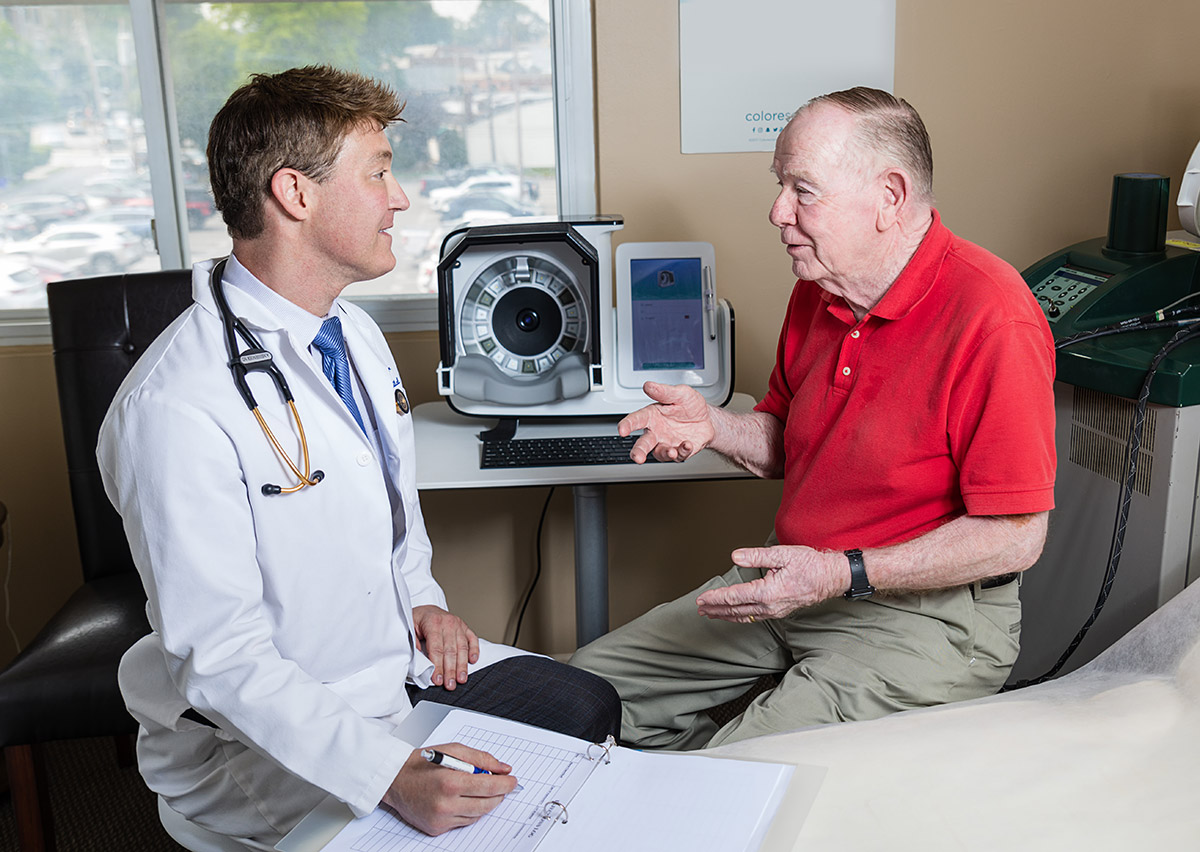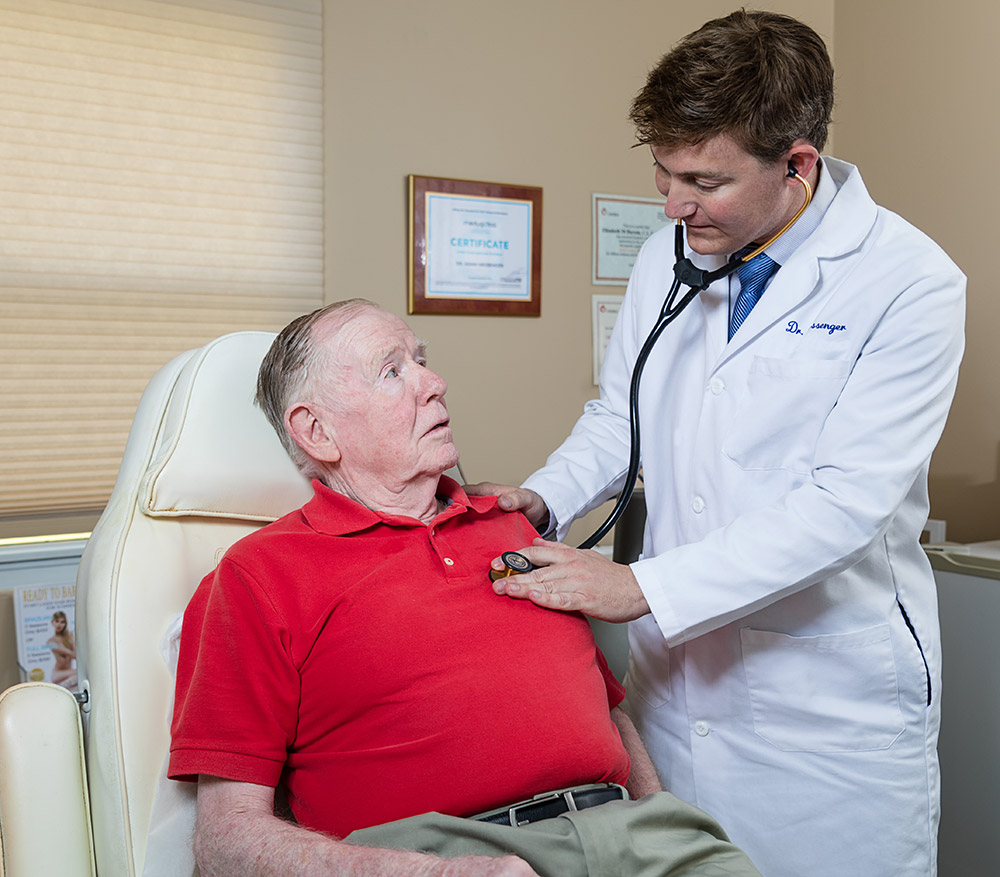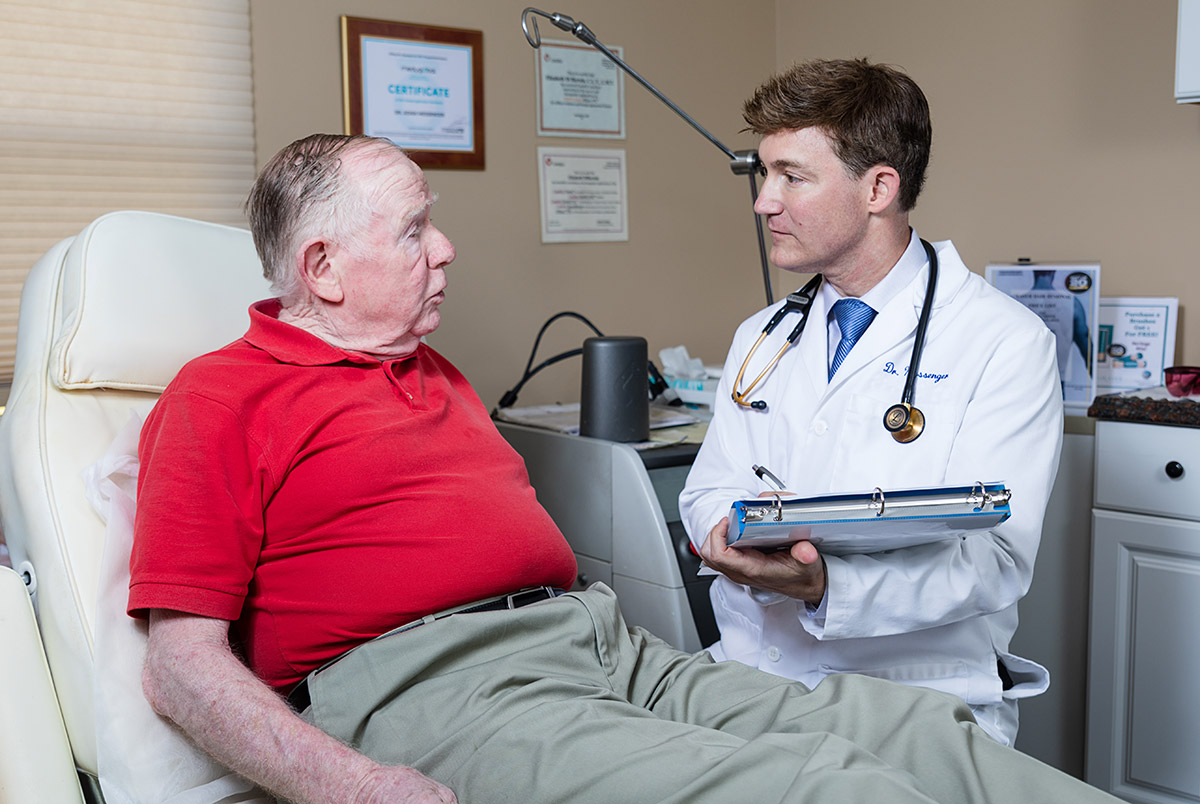
I entered medicine with the idea of becoming the traditional family physician who knows his patients and their families extremely well while blending my knowledge of medical science combined with a sound bedside manner into an art form. The goal was to be an expert diagnostician. To complement my knowledge to ensure I was being the best provider I could be, I obtained an additional master’s degree in pharmacology while in medical school.
I had entered med school the hard way, via a back door route, by going to graduate school and taking many of the medical school classes with the medical school professors and obtaining nearly perfect grades. I did not go directly into medical school from college and, in fact, had several other careers before medicine including serving in the military, working as a NASDAQ trader and as a medical assistant in an internal medicine practice. I fought my way up through the ranks, and while toiling away as a medical assistant, was blessed enough to be able to go to graduate school and learn the theoretical and “book science” aspects of medicine while seeing that science put into practice at the medical group.
In observing how to be a physician, I noted that medications and pharmacology were an integral part of Western medicine, which was focused on treating symptoms and being “reactive” instead of proactive. However, I was fortunate enough to learn from some older physicians the importance of being a diagnostician, and not just relying on lab values and radiology studies to do my diagnosing for me. I also learned about the importance of preventive care.

As I studied in medical school and during my internship and residency, I observed that the culture of medicine was falling apart. Physicians and nurses were being forced to work in assembly line fashion to see as many patients in as little time as possible. The result was that most of the training focused on making decisions based on lab values and radiology studies as there was not enough time to spend with the patients and glean the clues necessary to be a true diagnostician. Additionally, medicine became a “symptom only” treatment culture where medications were thrown at patients when they became ill. The preventive aspect was still bouncing around somewhere in the background, but treating the person after the fact, and intervening only after illness had set in replaced keeping people healthy.
In my opinion, I can say again that this was due to the lack of clinical personnel required to adequately handle the volume of patients in an effective manner. Additionally, cutting reimbursement to physicians led to hospitals and medical groups cutting back on clinical staff which further compounded the issue. Even medical education began to suffer as not only are physicians typically not paid to teach, but those who were effective teachers were struggling to handle their overburdened practices and were unable to volunteer adequate time. The result was that medical education had to be as rushed and harried as the culture at the end of the line which was eagerly awaiting more graduates to chew up and spit out.
Physicians and nurses are experiencing horrible levels of burnout, and groups and hospitals are undergoing massive turnover in staff. I became victim to this culture as I was trying to be the ideal physician who tried to manage patient care while spending the necessary amount of time with the patients and their families required to be an effective physician. The result was after residency I worked up to 80-90 hours per week on a regular basis. After 3 years of this my body finally broke down and I developed an autoimmune disease that attacked my autonomic nervous system and endocrine system.

I suddenly went from spending every minute of my life at the hospital to being bedbound and housebound for a year as my body could not control my blood pressure, heart rate, digestion, or hormonal balance. It was during this horrible, dark time as a patient that I saw firsthand how damaged our medical system had truly become. Because of the severity and rarity of my illness, I went to a world-renowned clinic and saw a “world expert”. Despite having heart rate and blood pressure irregularities and lab values indicating a severe multi-system issue, the physician was abusive and dismissive because he was not able to put the pieces together.
The only other time in my life I was treated this poorly was when I entered basic training after high school. The only difference was that then I expected to be treated that way and was at my healthiest and strongest, both physically and mentally.
The fascinating thing was the world expert knew I was a physician, had all my lab tests and medical history, and started the consultation by saying “I don’t know what you have so I can’t help you” even before examining me, which amazingly he never did. He never laid hands on me, including not even shaking my hand. He gave me advice to stop, cold turkey, all the medications I had been placed on to regulate my heart rate and blood pressure 48 hours before I departed on a flight back home. This would have had me in radical physiological decompensation while at 30,000 feet.
Fortunately, I realized I was dealing with an unprofessional and grossly incompetent “world expert” and took matters into my own hands. Working with my physicians back home that certainly recognized I had a severe issue I began to train myself in learning other aspects of medicine to supplement the conventional medications I was on. I utilized my pharmacology background to train myself in alternative medicine such as herbal and homeopathic remedies, as well as off-label uses of safe medications for complex disorders.
I also became trained in Yin Yoga and Meditation and began my journey back to becoming a true healer. Over the next several years I struggled to get my health back to a level where I could begin to return to work as a physician. The only difference was I had to find a low-impact position where I could physically handle the workload while utilizing my skills.
The result was I became a true diagnostician, or a medical detective, who specializes in sleuthing through difficult cases. I use my knowledge of both conventional and alternative medicine to come up with an individualized treatment regimen for each patient after listening to the patient.
In sum, the illness I sustained has led me down a unique and unconventional path that I grow to love more every day. I look forward to working with my colleagues and their patients to tackle those issues that fall into the “gray zone” of medicine where there are no discrete answers, and the patients suffer from clinical
paralysis by analysis. I take the ball and run with it, and whether it is an off-label use of conventional medication, use of alternative medications or a combination of both, my role as a healer is to find and treat the cause of the illness which may not be so cut and dry.
At the current moment, I am working on laying the groundwork for this practice. Oddly, health insurance companies do not believe in reimbursement for preventive medicine or an in-depth evaluation of issues that are not cut and dry and do not fit into a nice little diagnostic box. If a physician can’t address the issue in ten minutes and throw a prescription at a patient, there will be no payment for the time and services rendered. My practice will be a fair fee for service practice where the influences of health insurance and pharmaceutical companies will not be present. I will officially announce the launch of the practice when the plan comes to fruition.
If I ever end up in the ICU, I want Messenger as my physician. He just does not quit and is able to pull things out of the air that nobody else can.” – ICU Director
I met Adam backstage at a gig, and when I learned that he was a doctor, I asked him for some advice. On tour we don’t get many chances to get medical advice. I was aware of how awkward it can be to some lawyers and doctors to ask for professional advice in a social setting. I took the chance to ask Adam based on his positive demeanor, and since I am always willing to answer questions for anybody who asks me about my profession. Luckily, he was agreeable, and instantly said, “That looks like squamous cell cancer, get that cut off right away!” It was. I had been putting all manner of ointments on it after my local dermatologist’s office told me it was not cancer. He also correctly identified my mystery ailments (such as a toothache!) and reddish spots as possibly related to sinus infection. It was. After that, I think I asked him for the numbers on lotto, but I forgot them, since I don’t really do lotto. But they were likely correct!” – Steve Morse from legendary rock band Deep Purple
Dr. Messenger is one of the most skilled physicians I have ever met. He is clinically on target, his bedside manner is second to none, and he is cutting edge on therapies of existing diseases. More remarkable is his ability to combine allopathic and holistic approaches with successful patient outcomes.”
Dr. Messenger is the most amazing physician I have ever met. I came in with a number of problems and he actually LISTENED to me as I went over each one with me. Contrary to every other physician I have met, he sets the bar high. No one else comes close.”
I read about Dr. Messenger in a Westchester Magazine story about him self-diagnosing his illness when the Mayo Clinic could not. I was so impressed that I made an appointment with him to help me identify my own medical problem which my own doctors could not. He did so in one visit.”
Dr. Adam Messenger is the best I have ever met and I’m almost 83 years old. He listens to what I say, and even though I’m cranky and demanding, he will take all the time I need to understand what’s happening to me. I’ve never seen this doctor in any mood but great. Compassionate and understanding – no one is better.”